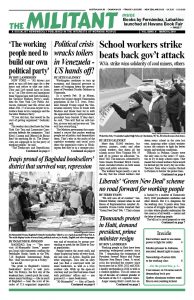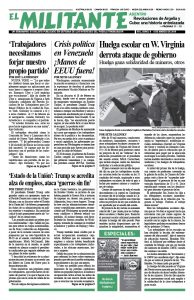March 7, 1994
Some 3,700 workers across South Africa won their one-month strike against Amalgamated Beverage Industries (ABI), a franchise of U.S. soft drink giant Coca-Cola. The 2,500 members of the Food and Allied Workers Union and 1,200 nonunion employees obtained a 15-month contract with a 13.1 percent wage increase. Workers returned to their jobs February 1.
Hundreds of workers returned every day to nine ABI plants throughout South Africa to protest the apartheid conditions in the factories. Workers explained that they would remain on strike if necessary until an ANC-led democratic government was elected at the end of April. In this period of social and political upheaval in South Africa, the striking workers succeeded in forging unity despite a 50 percent unemployment rate and attacks and scabbing organized by the company against the strike.
March 7, 1969
An Indian family that has been in the forefront of the struggle for Native American rights was forcefully evicted from their small home in Cornwall, N.Y., Feb. 21. It was the third time in the past two years that the Madison family has been compelled to move because of pressure from local racists who resent their activities and the fact that Black and Indian friends visit their home.
Anticipating the eviction, the Madisons had made plans some months ago to move into a house near an abandoned mill. Last month this building was burned to the ground.
Unable to find a new home because landlords have refused to rent to them, the Madisons are “camped out” in the corner of the abandoned mill itself where there is no electricity or water and very little heat. Before the Feb. 21 deadline the Madisons decided that they would not leave quietly on their own.
March 4, 1944
When Roosevelt and Biddle in July 1941 indicted the Minneapolis Truckdrivers Local 544-CIO and Trotskyist leaders under the Smith “Gag” Act, many labor leaders preferred to view this as an exceptional and isolated case. They treated the Minneapolis trial as a private conflict between the defendants and government which did not affect them or the rest of the labor movement. Their chief concern was to uphold Roosevelt’s reputation as “friend of labor” and guardian of civil liberties.
Events since the trial demonstrate the far-reaching significance of the Minneapolis prosecutions and convictions. In wielding the Smith Act club against the Trotskyists, the government launched the initial attack of an all-out offensive by Big Business and its political agents to smash the entire union movement and destroy the democratic rights of the American people.

